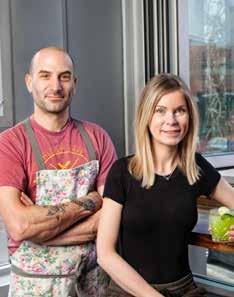
8 minute read
Surviving COVID-19
IIn the last few months, restaurants and bars across the province have faced unparalleled challenges.
Without the ability to serve customers in their restaurants, many businesses have had to make significant adjustments in order to survive this pandemic, and we have seen incredible examples of creativity and agility surface.
Advertisement
Here are a few ways that Alberta chefs and restaurants have pivoted their business model and product offerings to better meet the needs of a new environment.
Creating at-home meal kits For many restaurants, offering takeout is not as simple as cooking and packing up existing menu items. To ensure a quality product, consideration must be given to how the ingredients will hold up during the travel time, streamlining processes to suit a much leaner staff, cost, and packaging requirements. Several restaurateurs and chefs have opted to modify their signature dishes into DIY meal kits that are suitable for the home cook to assemble and finish at home.
Lil’ Empire, a small restaurant inside Annex Ales, owned by Karen Kho, Dave Sturies, Amber Anderson, and Shovik Sengupta, opened only six months before they had to make the heartbreaking decision to close temporarily. Kho and Sturies focused on Empire Provisions, setting up an online store to sell essential grocery items and takeaway meals, and the team decided to offer Lil’ Empire Burger Packs -100 kits weekly for online orders. To make high quality burgers for the home cook, each kit includes detailed instructions on how to best smash the patties.
Although fairly new to the Calgary food scene, Lil’ Empire had already established a strong following for their burgers, proven by how popular their burger kits have become, with all 100 kits selling within an hour of sales going live. “When we decided to try out the burger kits we knew there would be a positive response from our already-established customer base, but we didn’t expect it to have the overwhelming popularity that it did. I attribute this to the power of food and how it evokes nostalgia or provides comfort during times of duress,” says Kho.
Empire Smashburger kit
Several restaurants in Alberta have also become popular for their DIY at home meal kits. Across the province, pasta and pizza kits have become popular; in Edmonton Corso at Home pasta kits by the Corso 32 group have been high in demand, and Calgarians have been satisfying carb cravings with pasta and pizza kits from Cibo 17th and Annabelle’s Kitchen.
Starting a new business It might seem counterintuitive to start a new business amidst a pandemic, and when your current system is not suitable for a stay-at-home model, a new business
Cibo pasta kit

plan might just be what you need.
Roy Oh is a well-known chef in Calgary’s food scene, having founded the celebrated Anju restaurant. In mid-March when social distancing orders were put in place, Oh was days away from opening a new restaurant focused on an interactive dining experience, which became invalid before its introduction. Chef Oh decided to pivot once again and launch Roy’s Korean Kitchen offering take-out meals and prepared meals, including marinated meats and his famous sauces.
“I knew we had to do something that was approachable and well-loved. I thought our customers may want
Cam Dobranski and Jacqueline Warrell EATCROW

Roy’s Korean Kitchen

familiarity so we came up with Roy’s Korean Kitchen,” says Oh. With craveable dishes such as his popular gochujang wings, Korean grilled short ribs, and ramen carbonara, Roy’s Korean Kitchen garnered immediate buzz on social media once it launched.
Grey Mare burgers have become somewhat of an overnight sensation in Edmonton. Following a stint working internationally, chef David Leeder had been working on a new concept with the Wishbone team. Once it became apparent that COVID-19 would create new restrictions for the restaurant industry, Leeder, Brayden Kozak, and Brian Welch came together and drafted plans for Grey Mare.
“I wanted to create something where I could support the community by using other local businesses and farmers who have a good product. Most importantly, we wanted to feed people during this time,” says Leeder. Operating out of the Wishbone space, the approachable menu proudly touts quality local ingredients, and includes their famed burgers, hot chicken sandwiches, roast chicken, and carbonara croquettes. This is the type of food that customers want to dig into while sitting on their couch.
“What I took away from my travels is to focus on the quality of craftsmanship and the ingredients, I wanted to bring that sense of quality for a fair price point to Edmonton. We really took a dynamic approach to trying to make sure people are having the best experience possible. We test everything to see if it will survive in to-go boxes up to an hour or more, and its constantly evolving - we strive to be better every day.”
Innovating new distribution channels High fees can make third party delivery apps prohibitive for small businesses with already slim margins. Some businesses have employed creativity, innovation, and even collaboration with other businesses to come up with new ways to distribute their product to
customers around the city.
During Downtown Dining Week in Edmonton, Filistix owners Ariel del Rosario and Roel Canafranca, saw a slew of reservation cancellations. Del Rosario started asking customers who were calling to cancel if they would be interested in having the meal delivered to their home. Based on the demand, he knew immediately that they needed to re-strategize how to get their food to customers.
Filistix pivoted quickly, localizing their delivery initially to specific neighbourhoods, but they have now expanded delivery to the entire city, including Sherwood Park and St Albert. Edmontonians who had not tried Filistix before were now ordering from their delivery menu.
“As a result, we made the decision to move away from full service and focus on delivery, takeout and fast casual dining as our core business moving forward,” they say. “We’re excited for the change and we feel this will better position us to come out of this crisis on the positive end.” Filistix has now automated and launched their own online delivery site, FilistixDelivers.ca.
Respect the Technique had hosted several ramen pop-ups in late 2019. Since social distancing rules were put in place, chefs Kaede Hirooka and Jonathan Chung have been operating out of Avenida food hall, offering lunch bento boxes a few times each month. In addition, they have developed a contactless system where customers are able to pick-up orders in several locations around the city.
Leveraging in-progress plans The last few years have seen an increase in customer demand for DIY meal kits, casual dining, and food delivery services. Restrictions imposed by COVID-19 has seemingly escalated this demand. With foresight, several experienced restaurateurs had been developing a new
Corso at Home Sepps


vision for the next phase of their business, which has become even more relevant with social distancing in place.
Brasserie Kensington is an institution in Calgary, having operated for ten years. Owners Cam Dobranski and Jacqueline Warrell had begun planning for the next chapter of their restaurant, “We were ready for a change, we felt Calgary was ready for a change, and we wanted to get back to having fun in the kitchen…” says Warrell. Prior to COVID-19, the duo had been making changes to their space and menu testing in anticipation for the launch of EATCROW snack bar.
Their new concept offers an approachable menu of small, simple dishes, big on flavour and vegetarian friendly, that pair well with their draft cocktail and beer list. Their vision for EATCROW is that customers come in for snacks or order multiple dishes for a more robust meal. When dine-in service was restricted, Warrell and Dobranski launched take home meals through Brasserie, but enthusiastically announced EATCROW shortly after business reopening plans for Calgary were announced.
Sepp’s Pizza, from the folks behind Edmonton’s Ace Coffee and Leva Café, opened late 2019. Owner Joe Parrottino had pioneered pizza at the café close to 20 years ago, and had been refining his recipe over the years. As the economy declined in 2014, the business plan for Sepp’s took shape, “The idea to position the Sepp’s Pizza product as an exclusive online ordering and take out business, stemmed from our experience and market assessment” says Parrottino, “We knew our pizza was good and COVID simply
Respect the Technique

forced the public to consider takeout as the only option, which assisted our notoriety and exposure more rapidly”.
Sepp’s has garnered a reputation for quality ingredients and well executed pies, however Parrottino is quick to credit the contributions of a great brand designer and social media team to their rise in popularity.
Connie DeSousa and John Jackson are known for their group of restaurants in Calgary, which include the celebrated Charcut, Charbar, Rooftop Bar at Simmons, Alley Burger, and Chix Eggshop. For several years, the duo had been developing a pizza concept, working on their recipe and researching different pizza styles on their travels. With the sudden restrictions to dine-in service, they quickly pivoted to online orders with a menu and butchery provisions for curbside pick-up, however DeSousa and Jackson saw an opportunity to launch their pizza concept sooner to
Corso at home Grey Mare burger

accommodate the demand for takeout and delivery. Hence, Connie and John’s Pizza was born offering New York and Detroit styles for online ordering.
Even prior to COVID-19, restaurateurs and chefs have had to demonstrate resiliency to meet changing demands of customers, trends, and the economy. Social distancing guidelines and new health restrictions in Alberta have further tested this resiliency. While the future of hospitality remains unpredictable, entrepreneurial spirit and ingenuity is deeply rooted in this industry, and we will surely see more creative examples of businesses pivoting to flourish in this next normal.
Carmen Cheng comes from a long line of food lovers and notorious overorderers. She loves traveling, learning about different cuisines, and sharing her food adventures on social media.










